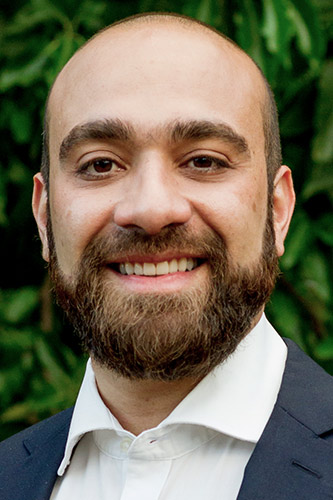

 In the February 13th edition of the Wall Street Journal, Professor Thomas W. Hazlett offers a breathless endorsement of market concentration with the T-Mobile acquisition of Sprint, his go-to example. Apparently, mergers and acquisitions benefit consumers because they enhance competition and generate all sorts of positive outcomes that could not possibly have occurred but for the reduction in the number of industry players. more
In the February 13th edition of the Wall Street Journal, Professor Thomas W. Hazlett offers a breathless endorsement of market concentration with the T-Mobile acquisition of Sprint, his go-to example. Apparently, mergers and acquisitions benefit consumers because they enhance competition and generate all sorts of positive outcomes that could not possibly have occurred but for the reduction in the number of industry players. more
 On 24-28 July, states convened in New York for the fifth session of the UN First Committee's Open ended Working Group on ICTs (OEWG), which aims to establish a common understanding of - and further develop the framework for - responsible state behaviour in cyberspace. This session marked a critical juncture in the process, with states negotiating the OEWG's annual progress report... more
On 24-28 July, states convened in New York for the fifth session of the UN First Committee's Open ended Working Group on ICTs (OEWG), which aims to establish a common understanding of - and further develop the framework for - responsible state behaviour in cyberspace. This session marked a critical juncture in the process, with states negotiating the OEWG's annual progress report... more
 As the current global geopolitical space becomes less friendly to Human Rights1, are there potential offsetting trends supporting them? Yes, but... it will require initiatives from the Global South for AI data-driven policies supportive of the UN's Sustainable Development Goals (SDGs), demonstrating the value of SDGs and Human Rights combined. more
As the current global geopolitical space becomes less friendly to Human Rights1, are there potential offsetting trends supporting them? Yes, but... it will require initiatives from the Global South for AI data-driven policies supportive of the UN's Sustainable Development Goals (SDGs), demonstrating the value of SDGs and Human Rights combined. more
Quantum computers are coming, and the American Bar Association's SciTech section is beginning to consider the legal implications. This raises the question, will the legal profession be able to adopt emerging quantum technologies on a tech-business as a usual basis? Or will the developments flowing from quantum mechanical theory present a categorical challenge to the legal-industrial complex? more
 The GNSO Council and the ICANN Board both seem poised to grant sufficient runway to the community to refine an idea for a simple ticketing system designed to centralize requests for registrant information disclosures and provide meaningful data that is likely to help ICANN staff enhance its assessment of the SSAD proposal. This is very good news for those who advocate for consumer safety and trust on the Internet, and it is very good news for the ICANN multistakeholder model. more
The GNSO Council and the ICANN Board both seem poised to grant sufficient runway to the community to refine an idea for a simple ticketing system designed to centralize requests for registrant information disclosures and provide meaningful data that is likely to help ICANN staff enhance its assessment of the SSAD proposal. This is very good news for those who advocate for consumer safety and trust on the Internet, and it is very good news for the ICANN multistakeholder model. more
 Imagine that you run an organization out of a building. Imagine that the landlord comes one day and says, "Oh I didn't know you are a resident of country X or dealing with anybody from country X. I have to close this place down right now." And then you are done. You don't have an organization anymore. This very scenario happens on the Internet. more
Imagine that you run an organization out of a building. Imagine that the landlord comes one day and says, "Oh I didn't know you are a resident of country X or dealing with anybody from country X. I have to close this place down right now." And then you are done. You don't have an organization anymore. This very scenario happens on the Internet. more
 Time has come again, another year of general elections in Brazil. Some 30,000 candidates are running for Executive and Legislative seats: 1 President, 27 State Governors, 27 Federal Senators, 513 Federal Deputies, 1059 State Deputies, 24 District Deputies to govern 212+ million people and one of the largest economies in the world. For a few lucky industries, success and failure do not correlate with who is in power; for others, policy and regulation are everyday business. more
Time has come again, another year of general elections in Brazil. Some 30,000 candidates are running for Executive and Legislative seats: 1 President, 27 State Governors, 27 Federal Senators, 513 Federal Deputies, 1059 State Deputies, 24 District Deputies to govern 212+ million people and one of the largest economies in the world. For a few lucky industries, success and failure do not correlate with who is in power; for others, policy and regulation are everyday business. more
 The UK government launched its 2022 Cyber Security Strategy on 15 December 2021, outlining its ambitious plans to improve the resilience of UK institutions and businesses while protecting the country's interests in cyberspace. The strategy signals a more involved approach by the government, which previously relied heavily on the private sector for leadership. The government's stated commitment to a 'whole of society' approach sounds really good on paper, but what exactly does it really mean? more
The UK government launched its 2022 Cyber Security Strategy on 15 December 2021, outlining its ambitious plans to improve the resilience of UK institutions and businesses while protecting the country's interests in cyberspace. The strategy signals a more involved approach by the government, which previously relied heavily on the private sector for leadership. The government's stated commitment to a 'whole of society' approach sounds really good on paper, but what exactly does it really mean? more
 Recently, there has been an interesting development in the liability of Internet intermediaries in Germany, and I will comment here in this text. The "Act on Copyright Liability Online Content Sharing Service Providers" began to apply on August 1, 2021 in the country. This act is a German attempt to deal with the controversy generated by the approval in 2019 of the new European directive on copyright, specifically with article 17. more
Recently, there has been an interesting development in the liability of Internet intermediaries in Germany, and I will comment here in this text. The "Act on Copyright Liability Online Content Sharing Service Providers" began to apply on August 1, 2021 in the country. This act is a German attempt to deal with the controversy generated by the approval in 2019 of the new European directive on copyright, specifically with article 17. more
 As a designated committee of experts prepares to draft a new treaty to combat the use of information and communications technologies in cybercrime at the UN in January 2022, it is paramount that other stakeholders oversee these discussions to avoid violating human rights on the Internet. This initiative was kickstarted by a 2019 resolution led by Russia and endorsed by other countries considered by many to behavior controversially on cybersecurity matters, such as China, Venezuela, Cambodia, North Korea, and others. more
As a designated committee of experts prepares to draft a new treaty to combat the use of information and communications technologies in cybercrime at the UN in January 2022, it is paramount that other stakeholders oversee these discussions to avoid violating human rights on the Internet. This initiative was kickstarted by a 2019 resolution led by Russia and endorsed by other countries considered by many to behavior controversially on cybersecurity matters, such as China, Venezuela, Cambodia, North Korea, and others. more
The promises of quantum computing, artificial intelligence, and other advancing technologies sound like magic. However, even magic is subject to the laws of economics. And even quantum computers are “legal things…technological tools that are bound to affect our lives in a tangible manner,” as Valentin Jeutner explains in The Quantum Imperative: Addressing the Legal Dimension of Quantum Computers. Analogous to Asimov’s Three Laws of Robotics, Professor Jeutner proposes a three-part “quantum imperative,” which “provides that regulators and developers must ensure that the development of quantum computers. more
 In April, I published an article, The Multistakeholder Moment of Truth: Will Stakeholders Hold ICANN Accountable?, alerting stakeholders that ICANN is violating its legal agreements with the U.S. Government -- namely the InterNIC licensing agreement and merged Memorandum of Understanding. At that time, I warned that it is essential for stakeholders not to remain silent in the face of this transgression, "hoping that such behavior left unchecked will end of its own accord." more
In April, I published an article, The Multistakeholder Moment of Truth: Will Stakeholders Hold ICANN Accountable?, alerting stakeholders that ICANN is violating its legal agreements with the U.S. Government -- namely the InterNIC licensing agreement and merged Memorandum of Understanding. At that time, I warned that it is essential for stakeholders not to remain silent in the face of this transgression, "hoping that such behavior left unchecked will end of its own accord." more
 On May 26, 2021, I submitted a complaint to ICANN's Complaints Officer, Krista Papac. In a nutshell, my complaint centers on ICANN's blatant violation of its Bylaws, specifically Section 2.2, named Restrictions, which expressly prohibits ICANN from acting as a registrar. However, despite the absence of any exceptions to this unambiguous prohibition, ICANN is acting improperly as a registrar for the purposes of warehousing and cybersquatting on certain domain names in the .com and .net registries. more
On May 26, 2021, I submitted a complaint to ICANN's Complaints Officer, Krista Papac. In a nutshell, my complaint centers on ICANN's blatant violation of its Bylaws, specifically Section 2.2, named Restrictions, which expressly prohibits ICANN from acting as a registrar. However, despite the absence of any exceptions to this unambiguous prohibition, ICANN is acting improperly as a registrar for the purposes of warehousing and cybersquatting on certain domain names in the .com and .net registries. more
 Back in the 1980s, everyone used the Lotus 1-2-3 spreadsheet on their PCs. In 1989, Borland released a competitor, Quattro Pro. It used the same menu commands as 1-2-3 so that users could import their 1-2-3 spreadsheets with keyboard macros. Lotus sued Borland, and after a loss in the district court, Borland won on appeal, arguing that the keyboard commands are a "method of operation" and not subject to copyright. Lotus appealed to the Supreme Court... more
Back in the 1980s, everyone used the Lotus 1-2-3 spreadsheet on their PCs. In 1989, Borland released a competitor, Quattro Pro. It used the same menu commands as 1-2-3 so that users could import their 1-2-3 spreadsheets with keyboard macros. Lotus sued Borland, and after a loss in the district court, Borland won on appeal, arguing that the keyboard commands are a "method of operation" and not subject to copyright. Lotus appealed to the Supreme Court... more
 While Panels under the UDRP and judges under the ACPA draw upon a similar body of principles in determining infringement -- both mechanisms, after all, are crafted to combat cybersquatting -- and though arbitration panels and judges undoubtedly view alleged tortious wrongdoing by abusive registrations of domain names through similar lenses and apply laws that may be outwardly similar, each protective mechanism has developed its own distinct and separate jurisprudence. more
While Panels under the UDRP and judges under the ACPA draw upon a similar body of principles in determining infringement -- both mechanisms, after all, are crafted to combat cybersquatting -- and though arbitration panels and judges undoubtedly view alleged tortious wrongdoing by abusive registrations of domain names through similar lenses and apply laws that may be outwardly similar, each protective mechanism has developed its own distinct and separate jurisprudence. more